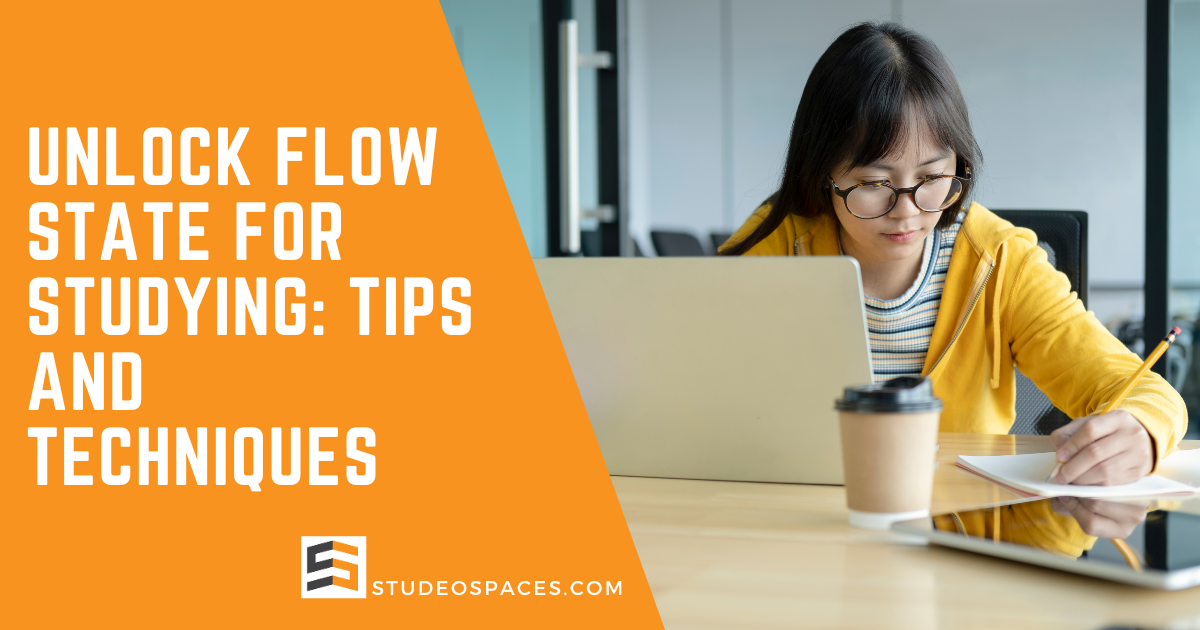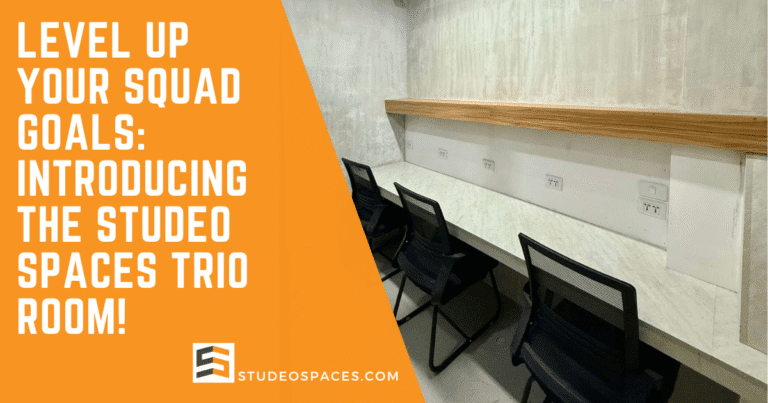
Unlock Flow State for Studying: Tips and Techniques: When mastering studying, getting into the “flow state” can be a game-changer for productivity and success. In the article “Key Tips For Cultivating Flow State In Your Study Routine,” readers are guided through practical strategies to enhance focus, eliminate distractions, and create an environment conducive to deep, uninterrupted study sessions.
By fostering habits such as setting clear goals, optimizing your workspace, and incorporating regular breaks, anyone can tap into this powerful state of hyper-productivity. And for those looking to take their study sessions to the next level, Studeo Spaces Study Hub in Sampaloc offers the perfect environment to thrive. Studeo Spaces provides an ideal haven for students and professionals aiming to unlock their full potential with its meticulously designed spaces and unwavering commitment to fostering peak performance.
Key Tips For Cultivating Flow State for Studying
Have you ever found yourself deeply engrossed in a task, completely losing track of time and emerging hours later, amazed by how much you’ve accomplished? This is the quintessential experience of the “flow state.” But how exactly does one cultivate such a state, especially when studying?
Whether you’re gearing up for an important exam or merely trying to stay on top of coursework, tapping into this hyper-productive and immersive state of mind can make a difference in how effectively you process and retain information. Here are some key tips for integrating this powerful tool into your study routine.
What is Flow State?
To begin with, it’s crucial to understand what the flow state is. Flow state, sometimes called “in the zone,” is a mental state in which a person performing an activity is fully immersed in a feeling of energized focus, full involvement, and enjoyment in the activity process. This state is often linked to peak performance levels, where everything seems to click, and tasks feel almost effortless.
Renowned psychologist Mihaly Csikszentmihalyi, who coined the term, described it as a state of consciousness where we perform at our best and reach high levels of creativity and productivity.
Importance of Achieving Flow in Study Sessions
But why is achieving a flow state important for your study sessions? Here are a few reasons:
- Enhanced Learning: When in flow, you’re not just soaking in information but also connecting the dots and integrating knowledge.
- Heightened Focus: Distractions melt away, leaving you intensely focused on your study material.
- Reduced Fatigue: Surprisingly, you can study longer without feeling tired since you’re fully engaged and enjoying the process.
- Increased Retention: The information you study during a flow state is likelier to stick.
Key Tips for Cultivating Flow State
Understanding Your Optimal Time for Study
Everyone has a specific time of the day when they are most alert and productive. Some people are early birds, while others are night owls. Identifying your peak performance time can be the key to achieving flow.
- Morning: If you’re most energetic after a night’s rest, allocate your most challenging subjects to this time.
- Afternoon: Post-lunch hours can work for shorter, less intense study sessions.
- Night: Late evenings and nights might be ideal if you feel most alive and focused during these hours.
Creating a Distraction-Free Environment
Your environment plays a significant role in getting into a flow state. A cluttered, noisy space can strip you from reaching that focused zone.
- Declutter: A clean and organized study space can visually cue you to be more focused.
- Minimalist Setup: Keep only the essential study materials on your desk.
- Noise Control: Use noise-canceling headphones or white-noise apps to block background disruptions.
Setting Clear Goals
Knowing your goals in your study session can enhance focus and drive. Break down your study material into manageable chunks and set specific, measurable goals.
- Short-Term Goals: Daily or session-based targets like “Review Chapter 3 of Biology.”
- Long-Term Goals: Weekly or monthly targets, such as “Complete all practice problems in the Chemistry workbook.”
Employing the Pomodoro Technique
The Pomodoro Technique involves breaking down your study time into intervals, typically 25 minutes of focused work followed by a 5-minute break. This approach keeps your mind fresh and can help maintain a higher level of focus.
| Interval | Duration |
|---|---|
| Study Period | 25 minutes |
| Short Break | 5 minutes |
| Long Break | After 4 intervals, take a 15-30 minute break |
Utilizing Active Learning Techniques
Passive reading can quickly become monotonous and disengage your brain. Active learning can keep your mind fully engaged.
- Summarization: Summarize sections in your own words.
- Teaching: Teach the material to someone else.
- Self-Questioning: Challenge yourself with questions on the topic.
Balancing Challenge with Skill
The key to achieving flow is to balance the complexity of the subject matter with your capability. If the study material is too easy, you’ll become bored; if it’s too complicated, you’ll get anxious.
- Optimize Difficulty: Select study materials that are challenging but still manageable.
- Gradual Increase: Slowly increase the complexity of the tasks as you master the easier ones.
Engaging in Physical Activity
Physical exercise can be a great way to prime your brain for intense study sessions. Even a short, brisk walk before you begin can enhance cognitive function.
Mindfulness and Meditation
Mindfulness practices like meditation can help prepare your mind to enter a flow state. Practicing mindfulness can improve your ability to focus and reduce anxiety, making it easier to immerse yourself in your study material.
Strategies to Maintain Flow State
Once you’ve achieved a flow state, the next challenge is maintaining it. Here are some tried-and-true methods:
Periodic Breaks
Even if you’re fully immersed, taking small breaks is essential to prevent burnout.
Hydration and Nutrition
Your brain needs fuel to function at its best. Ensure you’re hydrated and well-nourished during your study sessions.
Tracking Your Progress
Regularly assess how well you’re doing in achieving your set goals. This keeps you motivated and provides a sense of accomplishment.
Adaptability
If a certain method isn’t yielding results, be ready to adapt and try different strategies.
Common Pitfalls and How to Avoid Them
Overcommitting
It’s great to be ambitious, but overloading yourself can lead to frustration and burnout. Set realistic goals.
Ignoring Discomfort
Make adjustments immediately if your study environment becomes uncomfortable (e.g., poor lighting or bad posture). Minor discomforts can become big distractions.
Multitasking
Juggling multiple tasks at once can break your focus and pull you out of the flow state. Stick to one task at a time for best results.
The Role of Studeo Spaces Study Hub
Now, you might be wondering how Studeo Spaces Study Hub fits into this. Located in Sampaloc, Manila, Studeo Spaces is a meticulously designed study space to foster a flow state.
Why Studeo Spaces?
- Optimal Atmosphere: The hub is designed to eliminate distractions and create a serene environment conducive to studying.
- Flexible Hours: Open from 8:00 AM to 3:00 AM, seven days a week, you can choose to study at your optimal times.
- Amenities: Equipped with high-speed internet, comfortable seating, and designated quiet areas, Studeo Spaces covers all your study needs.
Enhancing Focus
With facilities like noise-canceling zones and individual study booths, Studeo Spaces allows you to create a personalized, distraction-free environment tailored to your study preferences.
Community and Motivation
Sometimes, seeing others immersed in their study routine can be motivating. Studeo Spaces offers a community of like-minded individuals, all striving for academic excellence.
Conclusion
Cultivating a flow state in your study routine isn’t a matter of chance; it requires deliberate strategy and practice. By understanding your optimal study times, creating a conducive environment, setting clear goals, and incorporating techniques like the Pomodoro method or active learning strategies, you’re well on your way to unlocking this powerful state.
For those who need extra help balancing these factors, locations like Studeo Spaces Study Hub offer an excellent foundation to build your study habits. Here, the environment is designed to help you achieve that elusive flow state, ensuring you reach your academic goals more quickly and confidently.
So, are you ready to get into the flow and take your study sessions to the next level?
Frequently Asked Questions About Flow State for Studying
What is the flow state, and how does it relate to studying?
The flow state, also known as “in the zone,” is a mental state of energized focus, full involvement, and enjoyment in an activity. It is linked to peak performance, where tasks feel effortless1. About studying, the flow state can lead to enhanced learning, heightened focus, reduced fatigue, and increased retention.
Why is achieving a flow state important for study sessions?
Achieving a flow state is essential for study sessions because when you are in flow, you absorb information, connect the dots, and integrate knowledge. It also leads to heightened focus, where distractions disappear2. You can also study for extended periods without feeling tired, and the information you study during a flow state is more likely to be remembered.
What are some key tips for cultivating a flow state for studying?
Some key tips for cultivating a flow state for studying include understanding your optimal time for study, creating a distraction-free environment, setting clear goals, employing the Pomodoro Technique, utilizing active learning techniques, balancing challenge with skill, engaging in physical activity, and practicing mindfulness and meditation.
How can understanding my optimal time for studying help me achieve a flow state?
Everyone has a specific time of day when they are most alert and productive3. Identifying your peak performance time can be key to achieving a flow state. Some people may be most productive in the morning, while others may be more productive in the afternoon or evening.
What kind of environment is conducive to achieving a flow state for studying?
A distraction-free environment is conducive to achieving a flow state for studying. This includes a clean and organized study space, a minimalist setup with only essential materials, and noise control using headphones or white-noise apps.
How can setting clear goals enhance my ability to reach a flow state for studying?
Knowing what you plan to accomplish in your study session can enhance focus and drive, which can help you reach a flow state when studying. It is helpful to break down study material into manageable chunks and set specific, measurable short-term and long-term goals.
How does the Pomodoro Technique help in achieving a flow state for studying?
The Pomodoro Technique breaks down study time into intervals of 25 minutes of focused work followed by 5-minute breaks6. This approach helps keep your mind fresh and maintain a higher level of focus, aiding in achieving a flow state for studying.
What active learning techniques can help me get into a flow state while studying?
Active learning techniques that can help you get into a flow state while studying include summarizing sections in your own words, teaching the material to someone else, and self-questioning. These techniques keep your mind fully engaged, which is essential for flow.
What are some common pitfalls that can disrupt a flow state for studying?
Common pitfalls that can disrupt a flow state during studying include overcommitting, ignoring discomfort, and multitasking9. Setting realistic goals, adjusting for discomfort in your study environment, and sticking to one task at a time for the best results is essential.
How can a dedicated study space like Studeo Spaces Study Hub help me achieve a flow state for studying?
A dedicated study space like Studeo Spaces Study Hub is designed to eliminate distractions and create a serene environment conducive to studying. It offers a location with an optimal atmosphere, flexible hours, and amenities such as high-speed internet and comfortable seating that can all help you achieve a flow state for studying. It can also provide a community and motivation by having others around to try to reach a flow state when studying.
Key Glossary Terms About Flow State For Studying
- Flow State: A mental state of complete immersion in an activity characterized by energized focus, full involvement, and enjoyment. Also known as being “in the zone.”
- Mihaly Csikszentmihalyi: The psychologist coined the term “flow state” and researched its impact on performance, creativity, and enjoyment.
- Pomodoro Technique: A time management method that breaks down work into intervals, typically 25 minutes of focused work followed by short breaks to maintain focus and manage fatigue.
- Active Learning: Study techniques that require active engagement with the material, such as summarization, teaching, or self-questioning, result in deeper processing and better retention of information.
- Passive Learning: A study method characterized by simply reading or listening to material without actively engaging or processing the information, leading to poorer retention.
- Distraction-Free Environment: A study space that is organized, free from clutter, and minimizes noise or other interruptions, allowing individuals to focus on their tasks without external disruptions.
- Optimal Time: The specific time of day during which an individual is most alert, energetic, and productive, often tied to their circadian rhythm.
- Studeo Spaces Study Hub: A study space designed to eliminate distractions and foster a serene environment conducive to learning, offering flexible hours, amenities, and a community for students.
- Mindfulness: A mental state achieved by focusing one’s awareness on the present moment while calmly acknowledging and accepting feelings, thoughts, and bodily sensations, often practiced through meditation.
- Burnout: A state of physical, emotional, and mental exhaustion caused by prolonged or excessive stress, often associated with feelings of cynicism and reduced professional efficacy.
Studeo Spaces Quick Links
- Book a Desk / Room
- Location
- Rates
- Features and Amenities
- Business Hours
- Private Rooms
- Latest News
Stay Connected
- Facebook: https://www.facebook.com/StudeoSpaces
- Tiktok: https://www.tiktok.com/@studeospaces
- Youtube: https://www.youtube.com/@StudeoSpaces






